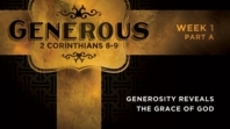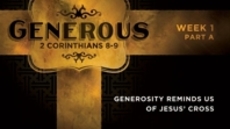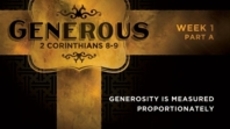Jesus’ generosity for His church is at the core of our faith. Find out how this generosity should season our hope and compel us to action in this sermon by Pastor Mark Driscoll. This is part 1 of week 1.
8:1 We want you to know, brothers, about the grace of God that has been given among the churches of Macedonia, 2 for in a severe test of affliction, their abundance of joy and their extreme poverty have overflowed in a wealth of generosity on their part. 3 For they gave according to their means, as I can testify, and beyond their means, of their own accord, 4 begging us earnestly for the favor of taking part in the relief of the saints— 5 and this, not as we expected, but they gave themselves first to the Lord and then by the will of God to us. 6 Accordingly, we urged Titus that as he had started, so he should complete among you this act of grace. 7 But as you excel in everything—in faith, in speech, in knowledge, in all earnestness, and in our love for you—see that you excel in this act of grace also.
8 I say this not as a command, but to prove by the earnestness of others that your love also is genuine. 9 For you know the grace of our Lord Jesus Christ, that though he was rich, yet for your sake he became poor, so that you by his poverty might become rich. 10 And in this matter I give my judgment: this benefits you, who a year ago started not only to do this work but also to desire to do it. 11 So now finish doing it as well, so that your readiness in desiring it may be matched by your completing it out of what you have. 12 For if the readiness is there, it is acceptable according to what a person has, not according to what he does not have. 13 For I do not mean that others should be eased and you burdened, but that as a matter of fairness 14 your abundance at the present time should supply their need, so that their abundance may supply your need, that there may be fairness. 15 As it is written, “Whoever gathered much had nothing left over, and whoever gathered little had no lack.”
16 But thanks be to God, who put into the heart of Titus the same earnest care I have for you. 17 For he not only accepted our appeal, but being himself very earnest he is going to you of his own accord. 18 With him we are sending the brother who is famous among all the churches for his preaching of the gospel. 19 And not only that, but he has been appointed by the churches to travel with us as we carry out this act of grace that is being ministered by us, for the glory of the Lord himself and to show our good will. 20 We take this course so that no one should blame us about this generous gift that is being administered by us, 21 for we aim at what is honorable not only in the Lord's sight but also in the sight of man. 22 And with them we are sending our brother whom we have often tested and found earnest in many matters, but who is now more earnest than ever because of his great confidence in you. 23 As for Titus, he is my partner and fellow worker for your benefit. And as for our brothers, they are messengers of the churches, the glory of Christ. 24 So give proof before the churches of your love and of our boasting about you to these men.
The Holy Bible, English Standard Version copyright © 2001 by Crossway Bibles, a publishing ministry of Good News Publishers. Used by permission. All rights reserved. Quotation information.
You’re listening to Generous, the 2008 Mars Hill Church Christmas sermon series. Pastor Mark Driscoll will be examining II Corinthians 8 and 9, which gives us an example to model our own giving by, and helps us remember that Jesus is the most generous giver of all. For more audio and video content, please visit marshillchurch.org.
Well, we know who’s got four-wheel drive.
(Laughter)
Welcome to Mars Hill. Good to have all six of you with us this lovely morning. We are going to have a good time in II Corinthians 8 and 9. If you’re new, my name’s Mark, one of the pastors here at the church. We’re doing a short two-week series called “Generous,” and if you’ve got a Bible, you can find II Corinthians 8 and 9. I’ll pray, and we’ll get right to work.
And with all sincerity, very grateful that you could join us, very grateful for those of you who braved the elements, and we’ll just start with our moment of prayer.
Father God, thank you so much that we get to meet. Thank you for those who have safely made it to Mars Hill for this service. God, we pray for all who will be attending any church today, that they would have safe travels in our city as the roads are icy and conditions are difficult.
God, as well, pray for those who are unable to join us or attend their church today, that your Holy Spirit would be with them, that they would get time in Scripture and prayer and still connect with you. God, as we study today, it is my prayer that we would learn about your generous nature, about how generous you have been to us and continue to be to us.
And God, we ask that because of Jesus, through the Holy Spirit, you would allow us to be a generous people, who share in his joy of generosity. And so, we ask for this grace as we open your word, in Jesus good name, amen.
Well, here’s where we’ll begin. It’s that time of year again. I don’t know about you – my house is looking like Christmas. We got the decorations up. The stockings are up. The Christmas tree’s up. The lights are up. And the kids are excited. Right? My son, Gideon, he’s funny. He loves nutcrackers. We’ve got these big nutcrackers all over the house, and he’s almost 3.
And I was out studying in the office recently, came in, the house is decorated up. We listen to the old Bing Crosby Christmas music, and my kids dance and have fun. It’s a great time. But all of the nutcrackers were missing – couldn’t find a one.
That night, went to tuck Gideon in, my 3-year-old, and around his bed, lined up like soldiers, are about a dozen nutcrackers. He stole every nutcracker in the whole house and put together his own nutcracker army to defend him in bed at night. And I asked him, I said, “Gideon, what happened to the nutcrackers? Where did they come from?”
He looked at me and he said, “I don’t know. I don’t know.”
(Laughter)
I said, “Dude.” He must have taken an hour, carrying these nutcrackers bigger than him to put ‘em all around his bed. It’s just that season where we’re reminded of the birth of our Lord and Savior, Jesus Christ, and it is marked, this season is, by generosity. This is where we give gifts. We remember the gifts that the Magi brought the baby Jesus.
This is also the time of year that a lot of people make year-end financial contributions to charities and churches of various sorts and kinds. And it is the time that we remember God came to us in humble form, as the man Jesus Christ, to give us the great gift, generously, of salvation.
Yet, this year for you, as for many, it is a very painful season. We’re mired in the worst economic slump and real estate downturn in 20 years; 2009 is very intimidating. Last month alone, 534,000 people lost their jobs. And in Washington state, 100 people a day are filing for bankruptcy. It’s a hard season for many.
The question is, what is happening? And I think one of the things that is happening is that the god of money has died. Jesus calls him Mammon. The god of money has died, and people are freaking out because their god, unlike our God, isn’t resurrecting any time soon. And the question is, how are we gonna live our life without our god? The one who gave us hope and joy and security and comfort and peace and helped our world on earth be our own little bit of Heaven?
And I want to help you with that. And the Bible speaks specifically to that. And that’s where we pick up II Corinthians 8 and 9. And herein, you will meet a church that is a lot like ours. The Corinthian church was young, urban, arty, cool. They had a great Web site.
(Laughter)
They also were newer Christians, and so they had lots of sin and folly. They were not yet disciplined financially, so they were a lot like our church. And Paul is going to teach them some things by showing them the example of another church in an area called Macedonia. A church that is so exemplary in its financial stewardship and generosity, that it is mentioned four times in the New Testament as an exemplary church, the kind of church that we aspire to be.
And so Paul has ten principles for them. We’ll look at each in succession over the course of two weeks, and the first is that generosity reveals the grace of God. See, money is one of the ways that we show that we belong to Jesus and understand him. Jesus talks about money about 25 percent of the time. He says that where our treasure is, our heart is. That our heart is reflected in our finances. And generosity reveals the grace of God, Paul says. I’ll read it to you, beginning in Chapter 8, verse 1.
“We want you to know, brothers, about the grace of God” – and the grace of God here is speaking specifically about financial grace, that God has been financially generous to provide for his people – “that has been given among the churches of Macedonia. For in a severe test of affliction” – listen to their circumstances, and perhaps for some of you, this is very familiar – “for in a severe test of affliction, their abundance of joy and their extreme poverty have overflowed in a wealth of generosity on their part.
“For they gave according to their means, as I can testify, and beyond their means. Great generosity of their own free will, begging us” – these are not people who are giving reluctantly, they’re begging to give generously – “begging us earnestly for the favor of taking part in the relief of the saints.” – helping other Christians who were struggling.
“In this, not as we expected, but they gave themselves first to the Lord” – they love Jesus – “and then by the will of God to us.” They love fellow Christians. They fulfilled Jesus’ two commands – to love God and to love others. “Accordingly, we urged Titus” – another Church leader – “that as he had started, so he should complete among you this act of grace.” Grace here being financial grace.
Here’s what’s going on . The Corinthian church is learning through Paul’s teaching from the example of the Macedonian church. Both churches were struggling under an economic recession that’s not totally unlike the one we are experiencing. But the Macedonians were suffering far more painfully than those who lived in Corinth. The economic downturn hit them harder.
Just so you know, in the current economic cycle, we’re the Corinthians, not the Macedonians. I know things are hard in the Greater Puget Sound area, but ultimately, there are many, if not most, major cities in the country where things are much worse. Our economy is diversified. Things are difficult, and I don’t want to in any way demean or dishonor or disrespect anyone who’s struggling financially, or lost a job, but it is worse elsewhere.
I’ll give you an example. I was in Dallas, Texas, not long ago, meeting with a number of pastors from large churches, and they were talking about their financial situation. And for many, it is bleak. It made me actually feel encouraged about our economy. One of my friends, he’s in Las Vegas, said that travel to Las Vegas has virtually ended, that the city is essentially nearing the point of being vacant and shut down. People just don’t have disposable income. That everyone lives there for the jobs, not because they love Vegas, and when the jobs leave, so do the people.
He said that homes have depreciated to such a degree that it’s an absolute crisis. He was telling me now that what’s happening there is that people, for example, a few years ago would have bought a home for $450,000.00. And today, it’s worth $250,000.00. And down the street, a neighbor with the exact same home in their development will have foreclosed on their home and it’s gone to the bank. And the bank is selling it for 150 or $200,000.00. So, what people are doing is literally moving out of their home, moving three doors down into a home just like their home, and shaving hundreds of thousands of dollars off of their mortgage, and handing all of that debt to the bank.
I know things in our area are bad, but it’s not that bad. It’s not at the point where your home is worth half or a third of what you paid for it, if you own one. So, we’re in the position of the Corinthians – things are hard, but it’s not yet fully catastrophic. There are places that it is approaching that kind of devastation.
Yet, what Paul tells the Corinthians, who are in the position as we are, struggling but not devastated, is that the Macedonians were an exemplary and amazing people. He marks the Macedonians with these two variables: They have severe affliction and extreme poverty. Now, think that about that. How many of us today would say, “That’s my situation, severe affliction, extreme poverty”? So, I’ve got affliction and poverty. Maybe a few of us have severe affliction and extreme poverty, but the whole church had severe affliction and extreme poverty.
The question, then, is, “Well, how did they respond?” This is amazing. Paul says they had abundant joy and overflowing generosity. I don’t know if you’ve seen a lot of abundant joy and overflowing generosity lately among those who are economically devastated. So, how in the world can you have overflowing joy and great generosity? Well, the only way you could have that is if your God isn’t money.
If your joy is in the god of money, and that god was crucified and shows no signs of resurrection, you have no reason for joy and generosity. If your God is Jesus, well then, your source of your joy and generosity is still alive and well. Therefore, so is your joy and generosity.
And what Paul was telling the Corinthians is this, that their whole view of money is wrong. It’s not biblical. It’s not Gospel oriented. It’s not Jesus centered. Let me give you a cultural understanding of what happened in Corinth.
In that day, there were two things that we have that they did not. One is banks who would loan you money for personal debt and credit. And two, a social service net so that if you did hit hard times, the government or social service agencies are there to help. They lacked both of those gifts.
Now, what would happen then is if you had an economic pain point, you’re struggling, can’t go to the bank. You can’t go to the government or the social service sector. You would go to a wealthy person known as a benefactor. A benefactor was someone who was affluent and rich and well to do. And you would sort of have to grovel and beg and ask them to help you – very humiliating, a bit denigrating. It’s an inferior/superior relationship.
You would then, if they agreed to give you money, become their beneficiary. So, they are the benefactor; you are the beneficiary. They are the giver; you are the taker. They are the superior; you are the inferior.
And then you would have to pay them back, by going to their parties and getting up and saying, “This person is so wonderful. They’ve paid my bills. They’ve done so many amazing things for me.” You’d need to go on a little personal PR campaign. Can you imagine how humiliating that is? How denigrating that is?
You would have to do them favors, speak well of them, show up at public gatherings and praise them. A lot of smug, self-righteousness and pretentiousness in this. When Paul went to Corinth, I Corinthians reveals that he didn’t take a salary from these people. The reason is, he didn’t want them to think of him in that way. “We are the benefactors. You are our humble servant, and you work for us and do what we tell you.”
Paul says, “I didn’t want that kind of relationship with you, because then you’ll tell me what I can and can’t preach, how I can and cannot lead. And then all of a sudden, you will disrespect and dishonor and denigrate me, and I can’t serve Jesus and get bossed around by a bunch of wealthy, affluent benefactors.
So, Paul said, “I took a job and I didn’t take your money, so I wouldn’t be in that kind of relationship with you, because your understanding of money is very corrupt.” And what Paul is saying is, “Don’t treat your poor Macedonian brothers and sisters in Christ that way either. Don’t think, ‘We are the benefactors. They are the beneficiaries. Our economic downturn is not as bad as theirs. Therefore, we will help the lowly Macedonians, providing they send us letters and banners and PR campaign, and make sure that the local news outlet has a feature story.’”
And here’s how Paul does this, it’s amazing. He tells the Corinthians that they are not the benefactors, that instead, they are the beneficiaries, and that God is the benefactor. He tells them – he uses the word repeatedly – that everything they have is from the grace of God.
He takes them from their arrogant position and puts them in a humble position. From their superior position, puts them in an inferior position. And says, “Don’t look down on the Macedonians. Don’t look down on those who are poor, those who are struggling, those who are economically distressed, because you’re no better than they are. Everything belongs to” – who? – “God.”
That God is the benefactor, and that we all are beneficiaries. This allows us to see that everything we have is a gift. Paul’s language, again, is that of grace. Your home belongs to God. Your clothes belong to God. Your food belongs to God. Your vehicle belongs to God. Everything you have, all of your collective wealth, possessions, credit, finances, job belongs to God.
That means we’re not owners, we’re stewards. That if it belongs to God, and he’s given some to us, we are to steward it. What that means is that God has been generous with us, and so, we should be generous with others. That God has been kind to us, so, we should be kind to others. That God has entrusted things to us so that we can distribute them to others.
The whole tenor and tone is one of generosity. See, if it’s my money, then I’m not obligated to give it to anyone, share it with anyone. If it’s God’s money, then I’m privileged and honored that God would share some with me, so that I could share some with you. In so doing, Paul absolutely inverts their entire economic paradigm.
And what he says is, “God is a giver, and God is a generous giver. And God wants us to understand that all that we have is his, so that we would join him in giving generously.” See, the Macedonians understood this. That’s why they had abundant joy and overflowing generosity in the midst of severe affliction and extreme poverty.
As you hear this sermon, some of you will hear Mark and Mars Hill want from me money. That’s not the issue. What we want for you is to reveal the grace of God. To show others that you think differently about money and people because of Jesus. That leads to the next point. “The generosity,” Paul says, “is a spiritual gift.” It is an enablement that God, the Holy Spirit, gives us.
All Christians are to be generous givers. Some of us have, in addition to that command, the spiritual gift of giving. Paul says this in Chapter 8:7, “But as you excel in everything – in faith, in speech, in knowledge, in all earnestness and in our love for you – see that you excel in this act of grace” – this charis – “also.” That the Holy Spirit has graced you, gifted you, so that you can have this spiritual gift of generosity in giving.
What this means is some of you are naturally inclined toward generosity and giving. All right? Those of you who have the spiritual gift of giving, those the Holy Spirit has opened your eyes. You see people’s needs. You feel concern for those who are struggling and suffering and hurting. Your heart is for the poor and the marginalized and the weak and the needy. And you just like to give. You want to give. You look for opportunities to give. You don’t need to be coerced to give. You delight in giving, and you’re very generous.
By the grace of God, I married a woman who’s like that. My wife is a giver. She gives money. She gives possessions. She buys presents. She buys groceries. I mean, my wife is always giving something. The back of her Suburban is always filled with stuff. And I asked her recently, I said, “Honey, why don’t you ever clean that out?” She said, “Oh, it’s always different stuff. These are things I buy for other people, and then when I see them, I give them to them. So I do clean it out, but it’s always full, ‘cause I’m always buying things for other people.”
I asked her, I said, “Honey, how do you know what all these needs are? Is there some Web site I have not found where people are making requests of you?” She said, “No, no, no. As I see needs, I buy things, and then when I see people again, I give them whatever it is they need.” That’s my wife. It’s one of the most beautiful, attractive parts of her whole character. I had to put it in the budget. “Okay, well, here’s how much money you get.” And she spends a lot more than that. But I love her, and we’re fine.
(Laughter)
She just likes to give. Praise God she does. Praise God she does. Now, for some of you, you don’t have the gift of giving. Right? It’s not easy for you. You’re not a generous tipper. And just so you know, if you go out after service and you pay at your meal, tip generously. Even little things of demonstration, of kindness and grace and love are very important. But some of you are not naturally givers. You’re takers.
You’re not looking for people’s needs. You’re looking for others to meet your needs. For those who are like that, you need to make a concerted effort to be observant of others and to see what needs there are, so that you could meet them, by the grace of God. And that’s what Paul is saying.
Now, what has happened is, as soon as the god of money died, people became less generous. I’ll give you a few statistics from George Barna, a researcher. He says, “During the past three months, 20 percent of all American households have decreased their giving to churches and other religious organizations. Nearly one-third of all adults have already reduced the amount of money they are donating to nonprofit entities, and two out of every three American families has been noticeably affected by the financial setbacks in America.
Bottom line is this: You will love money and use people, or you will love people and use money. It’s really that simple. It’s really that simple. And increasingly, more people are loving money and using people. And as Christians, it’s this wonderful opportunity for us to love people by using money. To share with them the grace of God. To be generous as God has been so generous with us.
I actually think this is one of the ripest opportunities we’ve had for the Gospel of Jesus Christ. People have needs, and we could love them. And one of the ways we could love them is by being generous with them. It’s a wonderful opportunity that God has given us. So, rather than being absolutely panic-stricken about our own financial portfolio, and yes, my retirement account is down. Yes, my property values are down. But, Mars Hill is up. It’s the only investment I’ve made that seems to be doing well. We’d like to see more of that.
And that is a spiritual gift. It’s a Holy Spirit enablement to see needs, to meet them, to help people because Jesus loves them and we love them, too. And right now is this ripe opportunity.
Leads to the next point: Generosity is a reminder of Jesus Christ. Generosity reminds us of the crucifixion of Jesus. See, money is in every way a reflection of our theological and biblical convictions. If you say, “I believe Jesus Christ died on the cross for my sins,” then I would say, “How generous are you?” You may say, “What does my money have to do with my spirituality?” It has everything to do with your spirituality.
If you believe God is generous, you should be generous. If you believe God is a giver, you should be a giver. If you believe that God helps people, you should help people – not because you have to, but because you get to, because that’s how God has treated you.
Paul says it this way, II Corinthians 8:8, 9. “I say this not as a command but to prove by the earnestness of others that your love also is genuine. For you know the grace of the Lord Jesus Christ, that though he was rich, yet for your sake he became poor, so that you by his poverty might become rich.”
Here’s the story of Jesus. Jesus is God. He lived eternally in Heaven. The Bible says he’s seated on a throne, that he was surrounded by angels, being worshipped in glory. The picture of Heaven in Revelation includes streets made out of gold. Just so you know, that’s an economic upturn. Like right now, if the legislature was debating, “Well, we need a new 520, we need a new Alaska Way Viaduct, who’s in favor of making it out of gold?” Like, if we get to that point, things are going well.
God lacks nothing. God lives without any deficit, want, or need. And our great God and Savior, Jesus Christ, left Heaven and he humbly, graciously came into human history. How was he born? Into poverty to a teenage girl and a working class construction worker, adoptive father named Joseph. Was he born in a palace? No, he was born in a barn. He was laid in the manger.
Jesus grew up in humble circumstances, in a little town called Nazareth that was not a big deal. His dad didn’t make an enormous income. He had brothers and sisters, and this was a working class, poor home. Jesus spent the first 30 years of his life – God – swinging a hammer, working a blue-collar job. He then went into ministry, and that didn’t pay well either.
Three years as a homeless guy, eating at people’s homes, and when it came time for him to pay taxes, do you remember he told his buddies to go fishing, that there would be a coin in the mouth of the fish, and that would pay his taxes? Just so you know. Right? If April rolls around and you can’t pay your taxes, and you’re at the point that you’re out fishing, hoping that there’s a credit card in the mouth of a fish, you have officially come to a very difficult place financially. Right? When that’s your bailout plan, like, you’re in serious trouble.
Jesus was broke. Jesus was poor. And Jesus was generous. That’s what he’s saying. He was generous to become a human being. He was generous to live in poverty. He was generous to go to the cross and suffer and die to pay our debt of sin to God. That was generous. Three days later, he rose, conquering Satan’s sin and death, to give us the generous gift of God the Holy Spirit, to give us the generous gift of salvation, to give us the generous gift of eternal life. Jesus is the greatest, most generous giver who has ever given. And his greatest gift was himself as a substitute and sacrifice on the cross to pay the penalty of our sins. Our Jesus is generous. Our Jesus is gracious. Our Jesus is a giver.
This is what distinguishes Jesus from the other false demon gods of the world. They’re all takers. Jesus is a giver. And so, when we are generous, we are reminding ourselves and others of the generosity of our great God and Savior, the Lord Jesus Christ. It’s a Gospel issue. It’s a Gospel issue. It’s not a financial issue. It’s a Gospel issue with financial implications.
He goes on to say, as well, regarding our individual generosity, generosity is to be measured proportionately. He says this, II Corinthians 8:10-12, “And in this matter, I give my judgment: This benefits you who a year ago started not only to do this work, but also to desire to do it. So now, finish doing it well, so that by your readiness in desiring it, it may be matched by your completing it out of what you have. For” – here’s the key – “if the readiness is there, it is acceptable according to what a person has, not according to what a person does not have.”
Here’s what he’s saying. You give out of what you have, not out of what you don’t have. That giving for Christians, and generosity is to be proportionate. Now, this raises the question some always ask, “Does this mean we need to tithe?” Tithe being giving 10 percent. The Bible tells us in the Old Testament to give off of our first fruits – that’s first and best to the Lord. That means before taxes and the government gets their cut, God is to get his cut.
And in the Old Testament, they did teach tithing, but tithing was not just 10 percent. Ten (10) percent was the beginning of the tithe, and then there’s gleanings for widows and orphans and the poor and those in need. There’s money for the Levitical priesthood, those who are in full time ministry. There was money for additionally feasts and festivals, sacrifices, seven-year celebrations. When you add up the aggregate giving to the temple, and to worship, and to God in the Old Testament, it’s more than 25 percent of your gross.
Okay, do we teach tithing. No, we teach New Testament grace giving, and that is each person gives according to the percentage that is generous for them. This means if you’re a single mom, who lost her job and your car broke down, like a friend of mine, your percentage is going to be very small. Like the widow’s mite, it might be – she gave one coin. And Jesus said, “That woman was very generous.” You say, “All she gave was a little bit.” Yeah, but that’s all she had was a little bit.
For some, who are very affluent, 10 percent is not even generous. It’s not even sacrificial. They don’t even feel it. So, it’s not about a percentage. It’s about proportionality. That’s what it’s about.
But let me give you some things to consider. A few statistics are insightful. The most unlikely tithers – people under the age of 25, single adults who have never been married, and liberals.
(Laughter)
Does that sound familiar? We call that Mars Hill. Half our church is single, in their 20s, and walks in the door just because they’ve been drinking the Seattle Kool-Aid, very liberal on some key social and theological issues. Seattle is the least generous city in America statistically, and Mars Hill is not a generous church statistically. Something to think about.
Additionally, the poorest Christians give away more dollars percentage wise than all but the wealthiest Christians. You know what’s very interesting? Poor people are generous. They see the needs of others. They see others that are worse off than them. And see, I would say, in this situation, don’t just look at those who are doing better than you and lament, look at those who are doing worse than you and help.
Poor people tend to see the needs of others who are struggling more than they, and they tend to be generous toward those in need, because they’re sympathetic. Statistically, as you make more money, you give less percentage wise, until you get to the point where those who are very wealthy and rich and affluent, they tend to give at a percentage that is similar to the poor. But statistically, the poor are the most generous.
And then lastly, more than one out of four American Protestants give away no money at all. That’s out of a Christianity Today article that quotes a book by Christian Smith, called Passing the Plate. It’s the most thorough examination of Christian giving ever undertaken in our nation. He is the nation’s leading sociologist in the area of religion. And think of that, one in four Protestant Americans gives zero dollars a year.
If you’re sitting in a row, that means every fourth person does nothing. Now, let me explain this to you. You can hear this as a condemnation. I hope you would hear it as a concern. If what you say is, “Jesus is my God. I love, treasure, honor him above all. There is no one and nothing more important to me than Jesus.” So, what did you do for the cause? “Nothing.” I would say, “Is Jesus truly a priority?”
Do you understand that all that you have was given to you from Jesus, and that if you’re consuming it all, you’re sinning against him. I would say the same thing to any father who says, “I love my family. I love my wife. I love my children. I treasure them.” How much do you make? “A hundred thousand dollars a year.” How much do you give to your family? “Nothing. Nothing.” Then, you’re a liar and a hypocrite, condemned by your own bank statement.
Because love is not just what we feel or what we say. Ultimately, love is what we do. Soren Kierkegaard, the great Danish philosopher, says it this way, “Love is the works of love.” You can’t say, “I love God,” and do nothing. You can’t say you love people and do nothing. And Jesus says he loves us, and if we love him, we’ll obey him. And his commandments are summarized in loving God and loving people. And Jesus says, “Where your treasure is, that’s where your heart really is.” And if you don’t give money to God and people, you really don’t have love for them in your heart.
I say that not as a condemnation, but as a concern that some of you really need to evaluate whether you worship your money or you worship with your money. Sadly, many worship their money.
Pastor Mark Driscoll
2 Corinthians 8

Generosity Reveals the Grace of God
December 14, 2008

Generosity is a Spiritual Gift
December 14, 2008

Generosity Reminds us of Jesus' Cross
December 14, 2008

Generosity is Measured Proportionately
December 14, 2008


